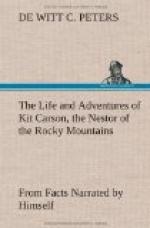On the morning of the day that the Apache village was discovered and captured, Kit Carson rode up to his superior officer and said, “Major, if no accident shall happen to prevent us, we are certain to overtake the Indians by two o’clock this afternoon. The signs are becoming so fresh that I feel confident that I will not be mistaken.” Carleton replied that if his words came true, he would present him with the finest hat that could be purchased in the United States. Strange as it may appear, the Indians were found at the hour which the guide had predicted. Sometime afterward, as it required quite a length of time to write and have the commission executed, Kit Carson was presented with a superb hat, in which there was a very appropriate inscription—viz.
+----------------+ | AT 2 O’CLOCK. | | | | KIT CARSON, | | | | FROM | | | | MAJOR CARLETON.| +----------------+
This prophecy was not guesswork. On the contrary, it was a matter of calculation, made on the same principle which any experienced workman would adopt, in reference to some undertaking that was within the range of his calling. A few years later, an officer, who had been an eye-witness of this incident, had the opportunity of trying Kit Carson a second time on the same business, but Kit was not mistaken. The Indians were overtaken within five minutes from the time he had foretold they would be.
Major Carleton, having performed all that lay in his power, commenced his homeward-bound march. While en route he traveled by the head waters of the Canadian River and its tributaries, and passed over bold and lofty mountains, and through a picturesque country. Finally he reached Taos. His command was in a very good condition, considering the hardships to which it had been exposed.
Although we say, in common parlance, that this command returned in good condition, yet it must not be presumed by this assertion that they came back making a fine appearance, like that presented by soldiers on a parade. When out on these campaigns, the comfort of the men is considered to be of more importance than either pomp or show; hence, those military trappings which are not particularly essential, are left behind, while there is just enough uniformity of dress remaining, to make them recognizable as soldiers. But little luggage can be transported on these trips, hence, the soldiers are obliged to limit their wants to actual necessity, which seldom amounts to more than the clothes they have on. When about starting out, the soldiers bear the appearance of being ready for hard work; which, after finishing, they are glad to return, even if they present themselves at their quarters in rags. It is wonderful what a change in personal appearance a few weeks can make by traveling in the mountains. The person thus exposed partially conforms to the habits of the wild Indians, both in appearance and




